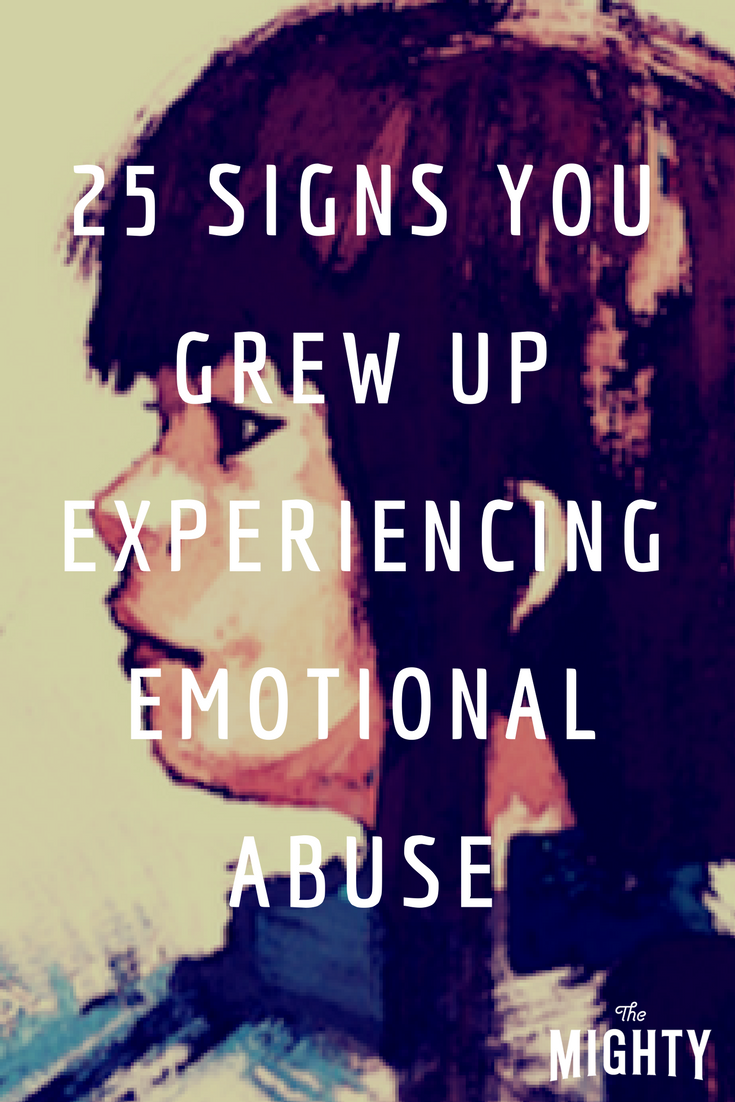Growing up, a lot of us don’t know or aren’t taught the signs of emotional abuse — especially when it’s the adults or other parental figures in our lives engaging in the abusive behavior. In fact, some of us who have experienced emotional abuse may not even realize we have, simply because it was the only reality we knew growing up.
Maybe your experience growing up with emotional abuse has left you thinking a steady chant of not good enough, not good enough, not good enough whenever you try to accomplish a task. Maybe you have trouble believing others can love you — all of you. No matter what your upbringing looked like, the reality is, many people have experienced emotional abuse in the formative years of childhood and adolescence, and it’s important that we talk about the signs. Understanding them may help you feel validated in seeking help as an adult — or perhaps these behaviors can help you recognize if a child needs help but doesn’t yet know how to ask for it.
To find out how people knew they had experienced emotional abuse growing up, we asked our mental health community to share, in hindsight, signs that showed them this was true of their lives.
Here’s what they had to say:
1. “I am in a constant state of blame no matter who is at fault. I hate going out in public or even going to work because I am afraid I am going to do something wrong and everyone will notice. I am afraid of making a mistake because I will beat myself up over it for the rest of the day.”
2. “I constantly apologize for things, even when it isn’t my fault. I avoid confrontation at all costs, in fear that voicing my opinions will result in people disliking me. I have extreme social anxiety, and I have a really hard time saying, ‘No’ to people, which results in overbooking myself and having little to no time to myself. And that makes my depression and anxiety even worse. It’s a vicious cycle.”
3. “I always have to do everything perfectly so nothing can go wrong. I’m a huge perfectionist because I’m scared people won’t like me if I don’t do everything right.”
4. “If I hear loud noises, especially shouting, I am immediately thrown back into the abuse. Even laughter or play fighting, it all sounds scary and makes me fear what’s about to happen next.”
5. “I bully myself using the same words I used to hear. [It’s like] I removed the people from my life who used to abuse me, then picked up where they left off.”
6. “[For me] it is always the constant need to be validated, like nothing I could ever do or achieve will be good enough (because my dad never told me he loved me). I was emotionally abused by my father, and the lack of a father figure who actually cared about me has had a resounding effect on my whole life. I have depression and anxiety, which started in teenage years and continued on to adulthood.”
7. “Dealing with conflict is extremely hard [for me]. Also, not having the right or necessary socialization skills to deal with interpersonal relationships. Therefore [my] friendships [often] don’t last.”
8. “[I find myself] always thinking people have an ulterior motive and [am] always second guessing whether someone deserves my loyalty or not in case I’m being manipulated again. [I] constantly try not to open up too much to someone because I think they will find me annoying and clingy or maybe just not good enough.”
9. “I notice children [who] seem scared of their parents — also, the kids at the park who can’t seem to act like a kid. Those are the ones I can’t get out of my mind later. I obsess about what their home life is like.”
10. “I have a strong and panicky emotional reactions when my husband uses a serious tone towards the kids, let alone raises his voice. Even if I completely agree with what he is doing (he is a great dad), it feels like he is punching me in the stomach every time I hear it.”
11. “The more upset I am, the more I look for any way it can possibly be my fault.”
12. “Even after leaving the one who abused me, their voice would ring loud in my head. I couldn’t make any decision on my own without their approval, even if that meant getting their disapproval. Their voice just wouldn’t leave. I still heard the criticism and nasty remarks to my body and life. It took years of fighting that voice to one day wake up and find my own. Sure, I still say sorry way too much, I don’t like being in situations I can’t control and I absolutely hate being restrained or backed away into a corner, [but] I can live with the things that cause me discomfort. But I couldn’t live with that voice.”
13. “[I’m] paranoid about potentially being manipulated and [not knowing] ‘until it’s too late.’”
14. “I’m always on edge around people. I’m sure they’re going to hurt me in some way, usually by mocking my weight. Because of this, I have eating disorders and walk with my head down. [It’s like] I’m like a kicked dog, to be honest.”
15. “[My] memories had a lot of gaps or [were] different than [those of] my siblings.”
16. “I am unable to believe someone when they say they love me. It feels like they are lying to me or trying to ‘please’ me. I question my partner’s love for me every day. He is the best person I know and only ever shows me love, yet I am always waiting, expecting him to leave me. I fear abandonment or the moment he realizes I am unlovable. My father never hugged me as a child and he couldn’t tell me he loved me, not ever. He was cold and distant. We lived in the same house, but he never treated me like a daughter. I always felt like my mum and I were just… renting the property from him. He was the landlord, the ‘big boss,’ never a father.”
17. “I’m always asking if people are mad at me.”
18. “I make up little white lies to people I perceive to be ‘superior’ [to] me, just to appeal to them better. It was a way to always stay on their good side, since I know exactly what it was like to do the opposite with an angry parent when I was a kid. I apologize for everything, even things that are not in my control.”
19. ”I have no personality. How can you have a unique voice when you’ve spent your life having to put on different facades?”
20. [I experience] insecurity. In everything. Very recently I was told I need to ‘focus on myself’ for now. Work through all the trauma. As a mother of two small children I view this as inconceivably selfish. I’m doing it but with the fear that my children will end up feeling as abandoned as I have. They say, ‘It’s time to do you for awhile’ [and] I keep thinking, ‘Do me… Am I doing this right?’”
21. “[I am] afraid to trust people, especially men. I have a terrible image of myself. I constantly feel like I never look good enough. I don’t take compliments well and I struggle with making eye contact when I talk to people.”
22. “I act strong and confident outwardly to people, even after I’ve ‘let them in,’ so they don’t feel they can emotionally abuse me. [I] find it hard to let them witness my mental illness at its bad points, for fear of being left or bullied again for it.”
23. “I was painfully shy in class and would get upset over the littlest things because I was made to feel worthless at home.”
24. “If I do something, for example, drop a glass and it smashes, I cry and cower and say sorry over and over again. I am constantly apologizing. I find it easier to lie and say things are OK when they’re not. I bottle things up then take the anger out on myself.”
25. “[I feel] like an item rather than a valued person.”
If you or someone you know needs help, visit our suicide prevention resources page.
If you need support right now, call the National Suicide Prevention Lifeline at 1-800-273-8255, the Trevor Project at 1-866-488-7386 or text “START” to 741-741. Head here for a list of crisis centers around the world.


